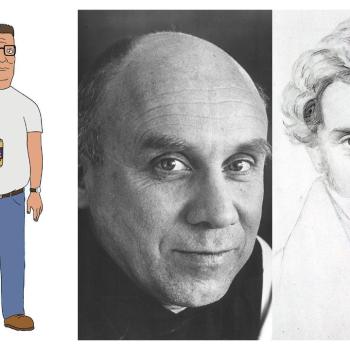“Oh my gosh, you have to watch _____!”
“Okay, what’s it about?” I ask suspiciously.
“Well, it’s about ____, but it’s pretty messed up. It’s really dark, but in kind of an interesting way…well, not so much interesting as disturbing…or maybe, soul-crushing is a better term? Anyway, most episodes lead me well into the abyss of nihilism and despair, and afterward, I feel awful about myself and life and humanity in general. But it’s so well-written. You have to see it”
Nah, I’m good. I’m a wimp about the latest TV shows and even movies. Every few years a gut-punch like Manchester by the Sea will do, but mostly I just like my usual comfort sitcoms (slightly too embarrassing to record here). Every once in a while I find a little room for a feel-good flick though. Queue, the 2018 Mr. Rogers documentary Won’t You Be My Neighbor? I saw this very recently, after a few years of good reviews swirling around in my head saying: just do yourself a favor and watch something nice and pleasant. That was about where my expectations were–something nice and pleasant. And it was, but I was surprisingly moved beyond that.
Kill ‘Em with Kindness
Ironically enough, Mr. Rogers can also disturb you, but thankfully not in the let’s-dive-into-the-latest-exploitation-of-human-depravity kind of way. For me, he killed me with kindness. The kind that leans more toward the virtuous love of neighbor than a superficial nicety. Over the course of the documentary, there’s a consistency of Fred Rogers honoring the dignity of others, especially children, that’s hard to look away from or dismiss as an act. As a parent, the part that killed me was the sense that Mr. Rodgers would probably honor the dignity of my kids better than I would if he were to visit. He saw the visits with them as a sacred encounter, truly a child of God–someone other than me, with her own given life, purpose, and destiny. How do you do that, Fred? He had a profound sense of mission.
Cor ad Cor Loquitur (Heart Speaks to Heart)
There’s a beautiful scene with a young Jeff Erlanger, who is in a wheelchair due to the effects of a tumor and nerve damage when he was younger. Jeff had made it through a harrowing surgery, and his parents reached out to Mr. Rogers, who then invited him on the show. They speak together as humans. The ups and downs, and the weight of sadness and the lightness of joy are all woven into a few minutes. It’s very subtle, fit for a child, but it’s there and real. And reflecting a high point of human union (quote), they sing a simple song together, It’s You I Like. It was incredibly refreshing to just witness the interplay between two quite different people–two hearts speaking and connecting. John Henry Newman used this phrase as his motto on his Cardinal Crest: Cor ad Cor Loquitur (Heart Speaks to Heart). The phrase has its roots in St. Francis de Sales’ Treatise on the Love of God, referring to God’s very heart speaking to ours in the depths and intimacy of prayer:
“Do you [notice] how the silence of afflicted lovers speaks by the apple of their eye, and by tears? Truly the chief exercise in mystical theology is to speak to God and to hear God speak in the bottom of the heart; and because this discourse passes in most secret aspirations and inspirations, we term it a silent conversing. Eyes speak to eyes, and heart to heart, and none understand what passes save the sacred lovers who speak.”
There is an echo of this in Mr. Roger’s Neighborhood, from Jeff the young boy to touching sensitively on difficult topics with children, the heart of the message goes far beyond the simple dialogue you hear.
A Particular Ministry and Mission
Unbeknownst to me, Mr. Rogers’ Neighborhood was not a successful second career after being a minister didn’t work out. His ministry and his show are one and the same. In fact, he sought and was given approval to carry out his ministry to children through television. In the documentary, he states, “I’m so convinced that the space between the television set and the viewer is holy ground. And what we put on the television can, by the Holy Spirit, be translated into what this person needs to hear and see, and without that translation it’s all dross as far as I’m concerned. When I walk in that studio door each day, I say, ‘Dear God, let some word that is heard be Yours.” However, I can’t think of many (or any) moments on his program where he spoke explicitly about God. Yet his heart was full and there was an expression of love evident in his work.
Mr. Rogers seemed to be a man of prayer. He made it clear himself, and as a trained Presbyterian minister it seems safe to believe. His heart seems to pour out the Fruits of the Spirit (Galatians 5:22-23)–gentleness, peace, kindness, and love are central themes of his program. These fruits are given, not conjured. Received from God and shared with neighbor.
Mr. Rogers and the Great Commandment
There’s something about a second view of Mr. Rogers as an adult, seeing my own children drawn to his way of being and communicating, that moves me. It’s not as if I want to petition the Catholic Church to alter Her criteria and begin the process of canonization for this celebrity Presbyterian minister; however, I think it’s a rare example accessible on our TVs of a fellow man living out his vocation to love God and neighbor.
“You shall love the Lord, your God, with all your heart, with all your soul, and with all your mind. This is the greatest and the first commandment. The second is like it: You shall love your neighbor as yourself. The whole law and the prophets depend on these two commandments.” (Matthew 22:36-40).
In Fred Rogers, we see this Great Commandment lived out in a particular way (even the title for the show has “Neighbor” in it). A man, at his work (producing and delivering a television show to children), trying to live out this commandment in the concrete moments of his career. It’s evident he loves first, before he speaks to the children, or plans a scene. The result is something noticeably different than what we often see on TV, or even in many daily situations. He reflects, “Love is at the root of everything – all learning, all parenting, all relationships. Love or the lack of it. And what we see and hear on the screen is part of who we become.” I know my parenting is different when I pause to acknowledge the presence and love of God, the love I have for my children. The way I interact with and listen to my wife. The purpose of my teaching and the affection for my students.
Receive in Order to Give
If I cannot pause to recognize the Love of God penetrating my own heart, the love He has for me; what do I have to pass on to those I encounter? At best, I can offer a pleasant but temporary interaction generated by willpower–nothing that would touch a heart. But that time with the Heart of God, that stirs and moves me and offers the profound awareness that all the universe is founded upon and sustained by His love; that’s what enables me to carry out the second part of the Great Commandment, to love my neighbor as myself. Only a heart that knows it’s loved can speak to another heart. Thanks, Mr. Rogers, for leaving us your particular example of that and for speaking to so many hearts.

















